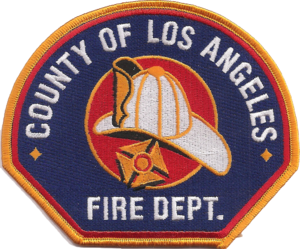Los Angeles County Fire Department
 Seal of the Los Angeles County Fire Department  Flag of the Los Angeles County Fire Department  Patch of the Los Angeles County Fire Department |
|
| Operational area | |
|---|---|
| Country |
|
| State |
|
| County |
|
| Agency overview | |
| Established | 1924 |
| Annual calls | 329,119 (2013) |
| Employees | 4,713 (2013) |
| Annual budget | $1.059 billion (2016) |
| Staffing | Career/Paid-On Call |
| Fire chief | Daryl L. Osby |
| EMS level | ALS |
| IAFF | 1014 |
| Facilities and equipment | |
| Divisions | 9 |
| Battalions | 22 |
| Stations | 173 |
| Engines | 177 frontline (164 staffed, 8 call) 50 reserve |
| Trucks | 3 |
| Quints | 29 |
| Squads | 68 |
| Tenders | 12 |
| HAZMAT | 4 |
| USAR | 2 |
| Wildland | 5 – OES Type 3 37 – Patrols |
| Bulldozers | 10 |
| Helicopters | 9 |
| Fireboats | 2 frontline, 1 reserve |
| Light and air | 4 |
| Website | |
| Official website | |
| IAFF website | |
The Los Angeles County Fire Department (LACoFD) provides firefighting services for the unincorporated parts of Los Angeles County, California, as well as 58 cities, including the city of La Habra which is located in Orange County and is the first city outside of Los Angeles County to contract with LACoFD. As of 2013[update] the department is responsible for just over 4 million residents spread out in over 1.2 million housing units across an area of 2,305 square miles (5,970 km2). According to Firehouse Magazine which keeps statistics on fire departments across the United States, the LACoFD is the 6th busiest department in the US, behind New York City Fire Department, Chicago Fire Department, Houston Fire Department, Los Angeles City Fire Department, and Dallas Fire Department. The department is commanded by Chief Daryl L. Osby with an annual budget of $939 million.
The Los Angeles County Fire Department began in 1920, and was known as the Los Angeles County Forestry Department and Los Angeles County Fire Protection Districts. The Los Angeles County Board of Supervisors enlisted Stuart J. Flintham to lead the new department, and directed him to establish a program for fire prevention and firefighting in the county. He succeeded in opening 30 Fire Protection Districts, which served, and continue to serve, towns and the unincorporated areas of Los Angeles County. Cities could choose to join the Fire Protection District by allocating property tax for this service. Cities formed as contract cities in the post-World War II period normally retained membership in the Fire Protection District. Following the passage of Proposition 13 in 1978, property taxes were capped at 1% and the Fire Department charged cities fees for services when annexation occurred. Properties within the district that are not covered under a fee for service arrangement also pay a special fire tax as a result of Proposition E, passed in 1997.
...
Wikipedia
